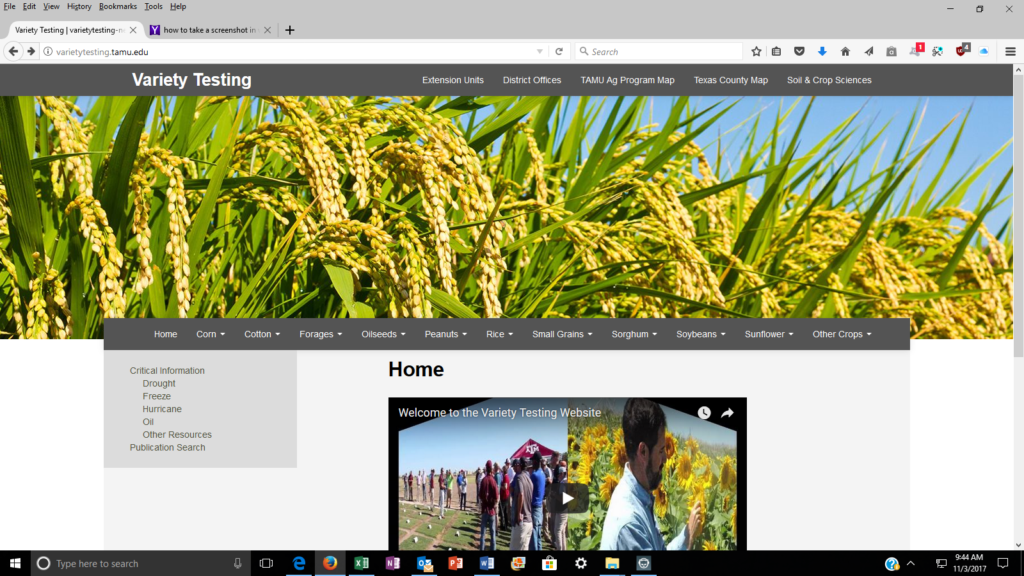by Calvin Trostle, Extension Agronomy, Lubbock, (806) 723-8432, ctrostle@ag.tamu.ed
Katrina Horn, Crop Testing Program director, (806) 845-8505, khorn@tamu.edu
Ron Schnell, Cropping Systems Extension Agronomy, College Station, (979) 845-2935, ronschnell@tamu.edu
A unit of Texas A&M AgriLife is the Crop Testing Program, http://varietytesting.tamu.edu/, which has been functioning for over 40 years. The program offers fee-based public testing of corn, grain sorghum, and sunflower hybrids and one large forage sorghum silage trial. The above webpage also publishes data from other AgriLife crop trials conducted outside the auspices of the Crop Testing Program. These include wheat, other small grains grain and forage trials, winter canola, and cotton.
The Crop Testing Program blankets the state for these fee-based tests for corn, grain sorghum, and the High Plains region for sunflower. To review the recent reports, click on the main page menu item for the crop of interest.
How are these trials conducted?
First, these are fee-based entries, which companies have committed to fund the work and the public reporting of the data. All data is published, and companies do not have a say in what these reports state. These are independent trials. They are conducted mostly on-farm, but a few may be located on a Texas A&M AgriLife Research Station. Though farmers sometimes express reservations about small plot work, this method is reliable for determining crop yield in a controlled setting. Small plot research sites are set out using a math/statistical design to minimize other factors that may influence results. Thus, results are highly likely due to genetic differences in the hybrids with minimal influence from other factors. Also, small plots allow AgriLife to conduct testing on a far greater number of hybrid entries, perhaps 30 or more. Conducting the same work on large plots (replicated field strip trials) is far more expensive, no more reliable, time consuming, interferes with farmer’s harvest, and often there is not enough seed available for these tests (in the case of experimentals).
In addition, Texas A&M AgriLife eventually calculates three-year trial averages when possible and adds these to the main report.
Current Reporting for the 2017 Cropping Season
Most of the corn and grain sorghum trial sites have been published. In addition, on each crop page to the lower right is a link to archived data from previous years. The following is 2017 crop and trial sites, reported to date as of November 2:
Corn grain hybrid trials:
- Reported: Bardwell, Calhoun County, College Station, Dumas, Greenville, Hondo, Monte Alto, San Patricio, Thrall
- Additional reports coming: Dalhart, Spearman, Wharton
Grain sorghum hybrid trials:
- Reported: College Station, Danevang, Greenville, Gregory, Limestone County, Monte Alto (full and limited irrigation), Nueces County, Thrall
- Additional reports coming: irrigated trials Plainview and Perryton
- Affiliated trials: Lubbock dryland, Hale Co. dryland, Lubbock irrigated sugarcane aphid tolerance tests, additional on-farm strip trials for SCA tolerance, Central and Coastal Bend, Texas
Sunflower hybrid trials:
- Irrigated confectionary, Lubbock and Dalhart
- Irrigated oilseed, Lubbock and Dalhart
Forage sorghum hybrid trial
- Bushland
Of Interest to Seed Companies—Supplemental Trials
An additional fee-based service of the Crop Testing Program is contract testing for seed companies who wish to screen advance lines or commercial hybrids to understand their performance as they either further develop their breeding program or pre-test hybrids in different regions to evaluate if they are appropriate and regionally adapted. These results are not publicized.
For more information on this program contact Katrina Horn.

Calvin Trostle
Professor and Extension Specialist
Lubbock, TX
803.746.6101
ctrostle@ag.tamu.edu
